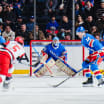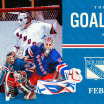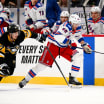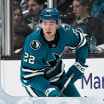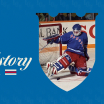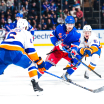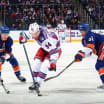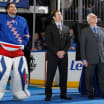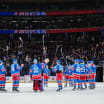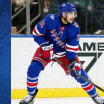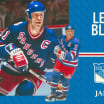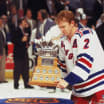It was back in late June when Sergei Zubov saw a call coming into his phone from a strange number but with a familiar voice on the other end. His instinctive reaction was to worry.
"It was J.D.," Zubov recalled. John Davidson at the time was just a month into his tenure as the new President of the Rangers, so something about it felt amiss. "I didn't expect to hear his voice. I just asked him, 'What's wrong with you? Where are you?' He was supposed to be back with the Rangers' camp, the Rookie Camp had just started back in New York."
What Zubov hadn't gamed out, for a fleeting moment anyway, was that his old friend who was calling from an unexpected place - a 416 area code, Toronto - also happens to chair the Selection Committee of the Hockey Hall of Fame. J.D. was calling with some news.
The Hall Calls for Sergei Zubov
Linchpin of '94 Rangers Takes His Place Among the Greats
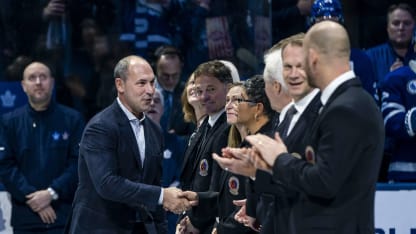
"Then Lanny got on the call" - that's Lanny McDonald, the Hall of Fame right wing and the Chair of the Hall's Board of Directors. "They got me," Zubov said in an interview with NYRangers.com. "They really got me."
Those men were calling back in June to tell Zubov about this weekend, when one of the great defensemen of his era, and one of the cornerstones of the Stanley Cup Champion Rangers, is called to the Hockey Hall of Fame as part of the Class of 2019. It is the final culmination of a sterling career that never seemed to capture the limelight it deserved in its day, but which was monumentally respected by his peers.
It included 1,068 NHL games for the Rangers, Pittsburgh and Dallas, plus 164 more in the playoffs and two Stanley Cups, an Olympic gold medal and 771 regular-season points - making Zubov the second-highest scoring Russian defenseman in NHL history, just behind Sergei Gonchar.
Zubov will be formally inducted into the Hall on Monday alongside Guy Carbonneau, Hayley Wickenheiser, Vaclav Nedomansky and builders Jim Rutherford and Jerry York. And when he gets there, he will rejoin ranks with three of his teammates from the 1994 Stanley Cup Champs: Mark Messier, Brian Leetch and Glenn Anderson.
"I couldn't be more excited for him," Leetch told NYRangers.com. "We talk about him amongst guys that played with him, about how underrated he was. His name always comes up about what an unbelievable player he was and the things he could do that you could never teach -- trying to explain to a defenseman the way he would come up the ice and look people off, and the tape-to-tape passes, and his vision of the game.
"But he always seemed to be not in the spotlight of whatever team he was on -- except from his teammates. So to see people go to bat for him that were on the committee, and to see them recognize him for his body of work, was exciting for a lot of us."
Zubov's stateside body of work can be traced back to the 1990 Draft, and Neil Smith, in his first Draft as the Rangers' GM, using a fifth-round selection - the Blueshirts acquired the pick as compensation when the Quebec Nordiques signed Guy Lafleur - to take a chance on a 19-year-old Soviet blueliner. Zubov was playing at the time with CSKA Moscow, better known as the Red Army - his teammates there included Slava Fetisov, Sergei Fedorov, Alexander Mogilny, Pavel Bure, the list goes on. He had no idea an NHL team had drafted him until many months later, when a well-known Russian player liaison named Sergei Levin flew to Moscow and met with Zubov and a few of his teammates to "explain what was going on," and what it might mean.
"I never thought about the NHL," Zubov said. "The biggest goal back then was making it to the national team and try to win World Championships and Olympics. That was the top level, the top notch.
"But the situation with the Red Army club, some guys already started coming over, and we had a bunch of guys took who took off in 1990, and then in '91. I believed then it was just a matter of time for us, the next wave to make a move. And the country was falling apart. Things got real loose."
Zubov was 22 years old and in North America less than a year when he made his NHL debut with the Rangers, Dec. 6, 1992, against the Maple Leafs at Madison Square Garden. He wound up with 31 points in 49 NHL games in 1992-93 as one of the brightest spots of a gloomy season, in which Leetch was lost to injury and the defending Presidents' Trophy winners fell short of the playoffs.
Then came 1993-94. It would be Zubov's first full year in the League, and even after a Hall of Fame career it remains perhaps his signature NHL season - only Wayne Gretzky, Doug Gilmour and Adam Oates had more assists that season than Zubov's 77, and his 89 points were the leading total on a loaded Rangers team. No defenseman since has led the eventual Stanley Cup champs in scoring.
"It was clear right from the beginning, right from training camp, that things are going to be different this year," Zubov said of '93-94. "Mike (Keenan) and the coaching staff -- he was a different coach right from the beginning. There were some bumps at the beginning, but as a group we knew: Something special is cooking."
Those early-season bumps were felt widely by the Rangers team, but acutely by Zubov himself. He played only two games at the start of the season before Keenan sent him back to the minors; Zubov accepted the decision but explained at the time that to his Russian ear, the word "Binghamton" was the same as saying "Siberia."
"Myself and my wife, we went to Binghamton for a couple games - Mike, he wasn't happy with my overall physical condition," Zubov said. "We went there, and fortunately I can say it was a quick trip, but then we came back, and after a couple games we had a game against the Canadiens back at the Garden."
It was on Oct. 28, 1993, and the Rangers were just a .500 team through 10 games, with one win in their previous four, including a notorious Garden loss to the Mighty Ducks. With under six minutes to play they trailed the defending Cup champions 3-1 on home ice, when Zubov lit a spark: He scored with 5:30 left, then in the frantic finish he one-timed an Esa Tikkanen pass off Adam Graves' stick with 9.9 seconds to play, tying it up and turning tension into wild celebration at the Garden.
The game ended in a 3-3 tie, but the bigger picture was the point: The Rangers would win their next eight games in a row, and go undefeated in their next 12. And Zubov never set foot back in Siberia.
"I think that game turned everything around," Zubov said, "both for myself and for the team."
Zubov brought up "one other game that pops up" from that season: the March 5 victory at Nassau Coliseum, in which Zubov's power-play blast with 1:03 to go sent the Rangers to a 5-4 win and broke a hex of 4½ years without a win on Long Island. Zubov's fist-pumping celebration on his knees is one of the indelible images of that championship season, and to this day he believes it was a critical breakthrough for the team, "a big jump" that became a factor in the way the Rangers manhandled the Isles the following month in their first-round playoff sweep.
That was the first step on the road to the '94 Cup; Zubov would win another one five years later alongside Carbonneau in Dallas, where he spent the final 12 seasons of his NHL career, and where the No. 56 he wore with the Stars will be retired sometime next season. Texas does everything big, and naturally it plays a big role in the narrative of Zubov's playing days in hockey. But so too, naturally, does the place where he started, where he brought his family to begin a new life and a new career, one that has led him, come Monday, into the Hockey Hall of Fame.
"New York was the best place for us as a family to move over," Zubov said. "We have great memories there, yes, but our family, we're still here, we live here, we have a place.
"New York," Zubov said, "is still our home."


